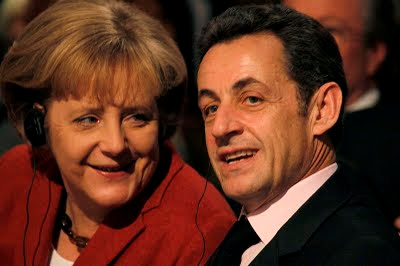
There really isn't any other interpretation. Having, along with many other British Euro-sceptics, predicted this for years, it is somewhat gratifying to see this confirmed, although this is surely much sooner than any but the most die-hard of Euro-sceptics predicted. From the Guardian:
"France and Germany have set out plans to create the first "true European economic government" headed by a single appointed leader, as part of major moves to synchronise tax and spending to save the failing eurozone.
The French president, Nicolas Sarkozy, and German chancellor, Angela Merkel, announced the dramatic proposals after a two-hour mini-summit. They also called for the imposition of tighter restrictions on member country's deficits and announced a synchronising of the tax policies of their own two countries. Sarkozy has also secured the support of Merkel for a Tobin tax – a financial tax on all international transactions – to raise funds to ease the crisis engulfing the European economy.
. . . .
The European Council president, Herman van Rompuy, will be asked to head the new economic government, and will set and enforce a deadline for all 17 eurozone members to reduce their deficits, putting pressure on countries such as Greece and Portugal to shore up public spending."
Let's be clear on this though - this isn't the victorious take-over that many Euro-sceptics (and some Euro-enthusiasts) predicted.
Instead it is a final stab at rescuing the project of a single European currency - a project which Euro-sceptics couldn't be accomplished without some kind of unified economic management beyond committees and well-meaning agreements. The mistake of Euro-sceptics back in the nineties was to think that the proponents of a single European currency were being disingenuous when they said that the independence of member states would be maintained. Instead, the advocates of the Euro were being honest - with disastrous consequences when the unworkable formula of a single currency without unified economic governance started to unravel.
It is, however, a sign of the all encompassing crisis in world affairs at the moment that this news is not being more widely carried. Whilst the BBC are carrying on the front page, the Guardian and the Times aren't.
[Picture: Frau Merkel chats with Monsieur Sarkozy, Munich, 2009. By Sebastian Zwez, via Wikipedia]


No comments:
Post a Comment